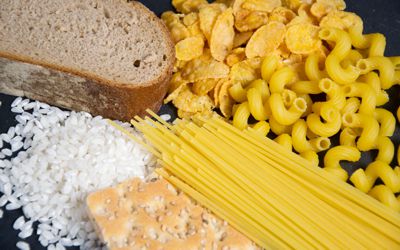Ep #6 Why Sugar Cravings Are So Strong

Do you crave sugary foods like candy, cereals and pumpkin-spice lattes even though they are making you sick? As discussed in previous podcasts, our primitive brain encourages us to eat by releasing feel-good neurotransmitters, such as dopamine. Highly processed foods that concentrate nutrients cause an exaggerated dopamine release, which makes us overemphasize the importance of these foods. This is especially true when we consume sugar. During this podcast, Dr. Vaughn discusses how our brains learn to crave certain foods and how food manufacturers use research to exploit this biology.
Ep #5 The Primitive Brain: How Biochemistry Encourages Food Addictions

Tens of thousands of years ago, the primitive brain was necessary to encourage decisions that benefited the survival of our species. Today, the primitive brain often encourages behaviors that don’t serve our bodies. For example, our primitive brain releases feel-good neurotransmitters when we eat foods high in nutrients, which was beneficial when food was scarce but today food is very abundant. In addition, highly processed foods artificially concentrate these nutrients causing an increased release of feel-good neurotransmitters and making foods addictive. During the podcast, Dr. Vaughn introduces the primitive brain as a basic concept in preparation for further discussions on the addictive properties of processed foods.
Ep #3 Science of Diabetes: Part 2 of 3

The second episode in a 3-part series on the basics of diabetes. During this episode, Dr. Vaughn discusses the pathophysiology (disease process) of diabetes including the roles of glucose, insulin and how current management approaches using pills and injections may worsen the disease state. Although this episode is full of science, Dr. Vaughn provides simple explanations and analogies to explain these very important concepts. Ultimately, this discussion leads to the conclusion that treating insulin resistance with more insulin is the wrong approach medically. In the next and final episode in this 3-part series, Dr. Vaughn introduces her naturally healthy approach to resolving diabetes without medications or injections .
Ep #2 Introduction to Diabetes: Part 1 of 3

Affecting nearly 100 million people and consuming 1 in 4 health care dollars in America, diabetes and prediabetes is an epidemic. People with diabetes are at increased risk of serious health complications including heart disease, stroke, kidney failure, amputation and much more. During the first episode in this 3-part series, Dr. Vaughn introduces diabetes and discusses risk factors, incidence, complications and financial implications. Parts 2 and 3 focus on the pathophysiology of diabetes and Dr. Vaughn’s recommendations for resolving diabetes without pills or injections.
Ep #1 Living a Healthy Life with DelaneMD Introduction

Are you type 2 diabetic or prediabetic? Are you tired of sticking your finger, taking insulin and struggling with the negative side effects of medications? Do you want a better, more natural way? Do you want to RESOLVE your diabetes permanently? This episode introduces Delane Vaughn, MD, and her approach to treating chronic illness, such as Diabetes, through lifestyle change rather than pills and injections. As a physician and certified life coach, Dr. Vaughn helps people resolve diabetes, get off medications and live a naturally healthy life.
Ep #33 Natural vs. Artificial Pleasure

When you have a bad day, we often look for ways to buffer away negative emotions. Sometimes buffering is accomplished through seeking out natural pleasures, such as accomplishment or exercise. However, often we turn to artificial pleasures that don’t serve our bodies or goals. During this podcast, I discuss the differences between natural and artificial pleasures, and how to know the difference. This podcast is the last DelaneMD weight loss podcast. Watch for my next podcast series on reversing Type 2 Diabetes naturally, which will be released in 2 weeks.
Ep #15 Where Would You Be?

Have you ever considered all the things in your life that you’ve started and stopped? All the things you didn’t follow through on, such as professional aspirations, personal commitments, gym memberships and weight loss programs? We’ve all had the experience of getting a great plan and then watching it fizzle out. We give ourselves innocent sounding excuses, but most of the time this is our primitive brain seeking the path of least resistance. In this podcast, I ask the question “How different would your life be if you ALWAYS followed through on your plans?” and discuss how our primitive brain often sabotages plans, including weight loss efforts.
Ep #14 Are You Being Manipulative?

Manipulation is a behavior that involves managing or influencing skillfully, typically in an unfair or coercive manner. While commonly used in interpersonal relationships to achieve a desired outcome, we often turn to these same techniques to motivate our own weight loss efforts. Just like a spouse or coworker may rebel against manipulative tactics, self-manipulation typically undermines our desired outcomes. In this podcast, I discuss how manipulation or coercion is ineffective and I offer self-love as a more effective motivational tool.
Ep #5 Failure: The Key to Success

When it comes to losing weight, most people look for “fool proof” diet plans that promise success without decision-making. When these highly-structured plans don’t work, we blame the plan. Shifting blame to the plan allows our primitive brain to emotionally insulate ourselves from feelings of failure. This natural inclination to avoid feelings of failure undermines weight loss efforts by removing the trial and error process, which is necessary to achieve success. This podcast discusses how this fear of failure may be undermining your weight loss efforts.
Ep #2: Carbs, Sugar & Processed Foods

Biology may encourage and reward you for eating poorly. Carbohydrates, sugar and processed foods stimulate feel good hormones, such as dopamine. This podcast will discuss the effects of these foods on the brain and body, and why you should avoid them.

